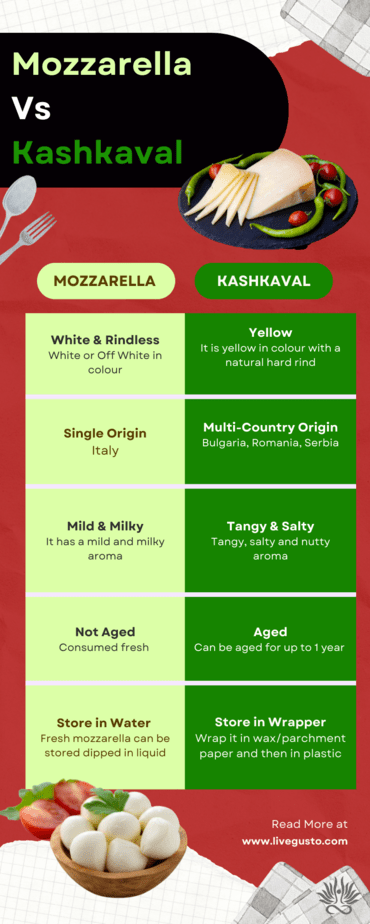Choosing between different types of cheese can be hard. One such difficult decision is mozzarella vs kashkaval cheese.
As a nutritionist, I often get asked how to pick between cheese types and comparing them nutritionally is the way to go. So, I bring you a detailed look into mozzarella and kashkaval so that you can make the right choice.

PEOPLE ALSO READ
| Mozzarella Vs Asiago – Which Cheese is Better? |
Mozzarella Vs Kashkaval Cheese: Nutritional & Outcome Differences
Let us begin by taking an overview of mozzarella vs kashkaval nutrition facts –
| BASE INGREDIENT | |
| Mozzarella
Cow/ Water Buffalo Milk |
Kashkaval Cheese
Cow/ Sheep Milk |
| TYPE | |
| Mozzarella
Semi- Soft |
Kashkaval Cheese
Semi-hard |
| TASTE | |
| Mozzarella
Mild & Milky |
Kashkaval Cheese
Nutty & Salty |
| AGED | |
| Mozzarella
No |
Kashkaval Cheese
Yes |
| CALORIE CONTENT | |
| Mozzarella
85* |
Kashkaval Cheese
100* |
| CARB CONTENT | |
| Mozzarella
0.6 g* |
Kashkaval Cheese
1 g* |
| FAT CONTENT | |
| Mozzarella
6 g* |
Kashkaval Cheese
7 g* |
| PROTEIN CONTENT | |
| Mozzarella
6 g* |
Kashkaval Cheese
6 g* |
| CALCIUM CONTENT | |
| Mozzarella
143 mg* |
Kashkaval Cheese
200 mg* |
| SODIUM CONTENT | |
| Mozzarella
178 mg* |
Kashkaval Cheese
224 mg* |
| NUTRINET PROFILE | |
| Mozzarella
Very Good |
Kashkaval Cheese
Very Good |
| ORAL & BONE HEALTH OUTCOME | |
| Mozzarella
Very Good |
Kashkaval Cheese
Very Good |
| TUMMY HEALTH OUTCOME | |
| Mozzarella
Very Good |
Kashkaval Cheese
Good |
| VERSATILITY | |
| Mozzarella
Very Good |
Kashkaval Cheese
Good |
| SHELF LIFE | |
| Mozzarella
5 Days |
Kashkaval Cheese
4 Weeks |
*Source: USDA; Quantity defined is 1 ounce (28.4g)
With this information as the base, let us delve deeper into the differences between mozzarella and kashkaval cheese-
Mozzarella Vs Kashkaval: The Method of Preparation
Mozzarella is generally made using cow’s milk. Curds are obtained by adding cheese culture and rennet to warmed milk. Once the curd is formed, the whey is separated. These curds are then washed, heated and stretched in water to obtain the stringy mozzarella cheese.
Kashkaval is made using cow milk or sheep milk or a mix of the two. The curds obtained by adding cheese culture are heated, stretched and then put in moulds and then cured for a certain time before packaging.
What Type of Cheese is Mozzarella Vs kashkaval?
Fresh mozzarella is a semi-soft cheese. There is a low moisture version available in the market which is slightly harder than the fresh version because of lower moisture content.
Kashkaval is best categorised as a semi-hard cheese. It has a much lower moisture content when compared to mozzarella.
Is Kashkaval the Same as Mozzarella in Taste & Texture?
Mozzarella when fresh is usually white in colour. It is soft and spongy in texture with a mild milky flavour. Processed mozzarella is slightly off white in colour and might have a salty taste.
Kashkaval is yellow in colour. It is nutty, salty and tangy in taste. It has a firm texture and can be cut easily with a knife.
Which Cheese Can be Aged: Mozzarella Or Kashkaval?
Mozzarella does not require aging. Fresh mozzarella is eaten within a few hours of its preparation. For its packed versions, it is packed soon after it has been prepared.
Kashkaval is aged for 6 months. It is during this aging that the cheese develops a salty and strong flavour.
Which Cheese Has Lower Calories: Mozzarella or Kashkaval?
Mozzarella and kashkaval cheese are much lower in calories when compared to many c popular cheeses like parmesan.
When we compare mozzarella and kashkaval calories, we find that kashkaval is slightly higher in calories.
Mozzarella or Kashkaval: What to Pick for a Low Carb Diet
Most food products have some amount of carbohydrate. These carbohydrates are sugar molecules that provide energy when broken down.
Cheese is not high in carbs which makes it an ideal addition to your low-carb diet plans. However, the amount of carbs varies between different types of cheese. In comparison to mozzarella, kashkaval is slightly higher in carbs
Mozzarella Vs Kashkaval Cheese: Which Has Lower Fats?
Kashakaval has a higher concentration of fats than mozzarella. These fats come from the concentration of milk fats.
So, if you are trying to reduce your fat intake, mozzarella is a better option.
Mozzarella Vs Kashkaval Cheese: Higher in Protein Content?
Mozzarella and kashkaval are both sources of high quality and good quantity protein. Therefore, these can help you reach your daily protein requirements.
In comparison to mozzarella, cheese has a slightly higher protein quantity because overall it is a more concentrated product.
Which Has More Calcium: Mozzarella or Kashkaval Cheese?
Being a milk product, cheese is an excellent source of calcium. Calcium is an important mineral that is needed for strong bones and teeth among other things.
Mozzarella and kashkaval are both rich in calcium but kashkaval has a higher amount of calcium.
Which Cheese is Lower in Sodium: Mozzarella or Kashkaval?
Sodium is a mineral that is needed by the body in very small amounts (500mg per day). It is needed to conduct nerve impulses, contract and relax muscles, and maintain water balance in the body.
Many people, especially those having a heart condition are advised to follow a low sodium diet. Cheese is generally high in sodium but mozzarella is one of the cheeses with a lower sodium content.
Which is More Nutrient Rich: Mozzarella or Kashkaval?
Mozzarella and kashkaval cheese are both rich in many essential nutrients like proteins, vitamins and minerals.
They contain minerals such as calcium, zinc, phosphorus, etc. The vitamins present in these include vitamin B, A, D, E and K in varying amounts.
What Is Better For Your Bones & Teeth: Mozzarella or Kashkaval?
Cheese is a really good addition to your diet plan if bone and teeth health are your primary concerns. Mozzarella and kashkaval thus can both benefit you.
Both mozzarella and kashkaval are rich in calcium which can help in maintaining the health of your bones and teeth. Along with this they are also rich in phosphorus which aids calcium absorption.
Mozzarella Vs Kashkaval: Which Cheese is Easier to DIgest?
Mozzarella can be considered to be easy on your gut since it contains probiotics or good bacteria. Probiotics help in easing the digestion of food and also help fight infections.
However, kashkaval too isn’t that bad either. Since it is very low in lactose, it can be digested even by the lactose intolerant.
More Versatile Cheese: Mozzarella or Edam Cheese?
Mozzarella is one of the most commonly consumed types of cheese. It also happens to be one of the most versatile. You can use it to make salads, sandwiches, pastas, and pizzas.
Kashkaval can be used as a table cheese. Since it has a high melting point, you can use it for frying. It can also be used in a number of dishes such as pizzas, lasagnas, etc.
Which Can Last Longer in the Refrigerator – Mozzarella or Kashkaval Cheese?
Fresh mozzarella that is available dipped in water or brine has a very low shelf life. It will last in the refrigerator for only up to a week.
Kashkaval being an aged cheese would last longer. If you pack it properly, it can be used for upto a month.
Mozzarella and Kashkaval, thus have more differences than similarities. What you pick would thus depend on your culinary needs, tastes and preferences. Also, as a nutritionist I also recommend limiting your intake to suggested serving which in this case is around 1 ounce a day.
Hope this blog provided you with clarity. Would love to hear your thoughts on the topic.

